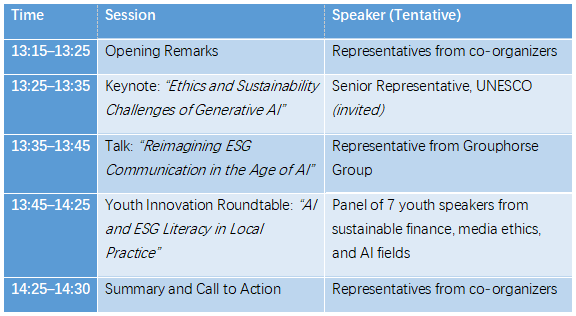Grouphorse in the News
Event Theme
“ESG-Oriented Media and AI Literacy: Empowering Youth for Digital Engagement in Health, Gender Equality, and Decent Work”
Organizers
United Nations University Institute in Macau
Grouphorse Group
Hunter College, City University of New York
Grouphorse ESG Global Governance Talent: College, Sichuan International Studies University
Grouphorse ESG Research Center, School of Foreign Languages, Southwest Petroleum University
Date, Venue, Format, and Language
Friday, 24 October 2025
13:15–14:30 (tentative)
Macau Tower Convention & Entertainment Centre
Format: In-person
Language: English (simultaneous interpretation provided)
Background and Rationale
Artificial Intelligence (AI) is profoundly transforming how we communicate, govern, invest, and perceive the environment. As AI becomes a vital tool for advancing sustainable development, the public’s ability to understand and responsibly apply these technologies directly impacts the fairness and effectiveness of global governance systems.
Against this backdrop, ESG (Environmental, Social, and Governance)-oriented media and AI literacy is emerging as a critical skillset of our era.
This side event aims to explore how AI, ESG communication, and media literacy can interact to empower the public—particularly youth, educators, and grassroots participants—with greater awareness, communicative competence, and action capacity in the digital governance ecosystem.
Led by the UNU Institute in Macau, a prominent research hub in AI and digital communication, this event will address key intersections such as generative AI, ESG communication ethics, youth education, and the integration of finance and social governance. Experts, policymakers, and young innovators will gather to exchange insights and experiences.
Objectives & Alignment with the Sustainable Development Goals (SDGs)
Promote public media literacy in AI and ESG (SDG 3 & SDG 14)
→ Support public understanding of AI’s impact on health and environmental governance, and enhance critical engagement.
Advance fairness and inclusion in digital systems (SDG 5)
→ Address algorithmic bias and AI-related discrimination; strengthen marginalized communities’ awareness and responsiveness in the digital sphere.
Equip youth with skills for a sustainable digital economy (SDG 8)
→ Train young people with ESG and AI literacy to connect them with future green employment and entrepreneurship opportunities.
Foster global cooperation in digital governance through media literacy (SDG 17)
→ Build responsible, cross-border communication mechanisms for sustainable development.
Preliminary Agenda

Guiding Questions
How can media literacy help society better understand and assess ESG values in the age of AI?
What are the sustainability risks of inequitable digital communication?
How can youth and educators promote the localization of AI ethics and ESG communication?
What international cooperation mechanisms can support a sustainable AI communication ecosystem?
Expected Outcomes
Deliver policy recommendations to the UN and national governments on integrating AI and ESG media literacy into national 2030 agendas
Launch a draft/pilot framework for a “Global ESG Media Literacy Cooperation Initiative”
Establish cross-border collaboration networks focused on youth education, media equity, and responsible tech governance
Target Audience
UN system organizations
Youth delegates, educators, scholars, and think tank representatives
ESG professionals, AI industry representatives, media ethics researchers
Civil society and local institutional representatives











